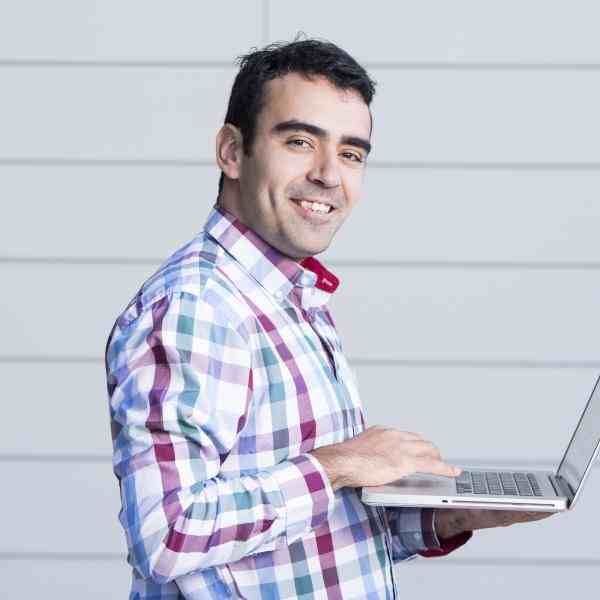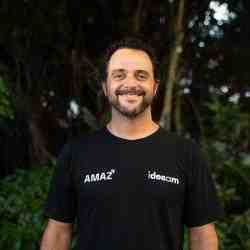Introduction
Pablo is democratizing access to high quality professional support and business mentoring for early stage entrepreneurs who have been excluded from the traditional entrepreneurial ecosystem for gender, racial and socioeconomic reasons. Thanks to his accessible and scalable online incubator, Pablo fosters employment creation and positively affects the lives of thousands, unleashing the power of entrepreneurship to create social and economic growth.
The New Idea
Pablo advocates for a market-based approach to poverty alleviation where local entrepreneurship and job creation are core. Through his personal experience, Pablo realized that the existing entrepreneurship ecosystem is selective and exclusive, addressed mostly to a major-city-hub privilege in affluent countries, but generally out of reach of the 100+ million entrepreneurs around the world with internet access but no access to quality support. He decided to turn this problem into a solution for these "billions" of entrepreneurs that until now have been excluded from the entrepreneurship ecosystem. Pablo created Bridge for Billions (B4B) to provide access to incubation to a new mass target, and not just for the 2-3% of the entrepreneurs who call themselves “innovators”, nor for the current profile of the entrepreneur of "Caucasian, male from a middle to upper middle class social background".
Pablo aims to widen the incubator approach beyond its narrow focus on technological and investment projects targeted at citizens from developed countries. Bridge for Billions democratizes access to quality entrepreneurship support and empowers entrepreneurs who are solving market gaps that are currently ignored by the traditional entrepreneurship communities.
The resulting model is an online, low-cost, highly interactive incubator equipped with data visualization technology conceived to give universal access to entrepreneurship, dismantling the existing barriers of gender, race and socioeconomic background, and fostering employment creation in areas where entrepreneurs until now had lack of access to this kind of support.
B4B bridges the best of both worlds: the untapped talent pool of entrepreneurs around the world with a streamlined set of business creation tools that facilitate learning combined with structured mentorship. The platform recreates the startup journey through eight on-line detailed modules, allowing for an efficient training and mentoring process.
B4B has been tested by incubators, accelerators, entrepreneurs and experts from around the world and it provides a uniquely holistic and structured path to plan a business, coupled with unprecedented access to one-on-one mentorship and an intuitive online interface. So effective is Pablo´s solution that existing support programs for entrepreneurs (face to face incubators, universities) are using Bridge for Billions to guide and train their entrepreneurs.
In addition, Pablo has ideated a business model that makes this solution into a scalable venture. Unlike other incubators that rely on either philanthropy or on heavily taxing the entrepreneur with an equity stake, B4B finances its operations through a business arm that uses the same technology applied to corporate engagement programs to source mentors. Furthermore, B4B is open to all individual entrepreneurs for a nominal fee, leveling the playfield for passionate entrepreneurs all over the world, as there is no screening or testing before acceptance. In the entrepreneurship sphere, Bridge for Billions is the essence of a scalable online incubation providing a meaningful and personalized experience to potentially millions of entrepreneurs through a profitable model from the onset.
The Problem
Unemployment is one of the greatest world challenges of this decade due to population growth and automatization, and entrepreneurship and innovation can play an essential role in driving the needed structural transformation of our economies. Nevertheless, our education systems and exclusive entrepreneurial ecosystems are currently not built or prepared for this challenge.
Location, educational background and financial circumstances can limit the possibility for the over 280 million entrepreneurs that are estimated to exist globally, to receive mentorship, support and visibility. Entrepreneurship ecosystems worldwide are not inclusive and systemically exclude low-income, women and racial minority entrepreneurs, which can lead to a dangerous bias in market-based solutions, designed by and for a small minority of the world’s population.
While the quality and capacity of the over 9,000 incubators that exist globally vary, their operations are often inefficient and their models are not scalable to meet the needs of the majority of the world’s entrepreneurs. Early-stage entrepreneurs only have access to support programs that request equity or high fees, rarely exist outside main cities, and have very low acceptance rates. Most programs ask for solid business plans and prototypes which are costly and hard to create, excluding anyone without resources or a business background.
Similarly, incubators’ budgets and efforts are usually directed at investors rather than entrepreneurs, which means that a vast number of potentially good ideas are set aside because they don’t fit the investor’s preferred parameters, usually aiming for tech-based and potentially high-income ideas.
Furthermore, most programs have a limited mentoring capacity and are unable to provide structured, individualized and in-depth support to larger cohorts of entrepreneurs. Conversely many professionals are increasingly looking to bring their experience, knowledge and passion to social causes yet cannot find suitable vehicles.
In some cases, incubators don’t work with a validated methodology and merely focus on supporting the entrepreneurs with workspace or local connections and rarely guide entrepreneurs on how to think about their business and understand the “why” of their decision making.
The Strategy
Bridge for Billions is an online platform that recreates the startup journey through eight structured online modules (value proposition, competition map, stakeholder map, sales & activities, pricing & business model, growth plan, financial projections and social impact metrics) over three months and enables two-way learning for entrepreneurs and mentors.
The content and design of B4B was tested with “non-typical” entrepreneurs in developing countries such as Mexico and Ghana. The work on their projects, ranging from agave syrup in a small farming community, to bamboo bikes, or e-learning in Africa, was essential in creating content that is adapted to those with no or very little prior business knowledge. These are examples of the entrepreneurs that Bridge for Billions targets: mainly young, with high awareness of their local context and access to a computer and an internet connection.
In this context, B4B provides an individualized experience for entrepreneurs to sharpen and validate their business plans and engages mentors to effortlessly act as their sounding board along this process. The platform guides the structured conversation between mentors and entrepreneurs and helps identify where the entrepreneur may struggle. Through B4B’s technology, the mentor can easily visualize the entrepreneur’s data and thought-process and feel confident to give critical advice and insight. The platform uses an algorithm for smart affinity matching between entrepreneurs and mentors, and can be changed in case of mismatch or misunderstanding.
As a Benefit Corporation that operates as a Software as a Service (SaaS) business, B4B offers online incubation services to independent entrepreneurs (for 120 US dollars a month, for three months) as well as to organizations serving entrepreneurs. It generates revenue by licensing the service to entrepreneurship support programs and corporations (between 2,000 to 5,000 US dollars per year) and uses these revenues to subsidize individual entrepreneurs with limited means.
Entrepreneurs are acquired via social media and online marketing, as well as through a global network of partners who receive discount codes to share among their networks. Any incubator, accelerator, foundation, investment fund, university in the world can use the structure and visual power of B4B management tool for free if they help ensure the program fee is affordable for their targeted entrepreneurs. This realizes Pablo´s dream and core objective, to empower those entrepreneurs focused on local problems and issues and who are normally excluded from the system. B4B offers guidance and resources, allowing them to optimize and materialize their own self designed solutions.
One-off fees and volume discounts can also be offered to large organizations and government programs that support entrepreneurs. As an online platform, unit costs are very small and limit for growth relies mainly on marketing and sales. Using the power of social media to reach entrepreneurs worldwide and by creating global partnership with these organizations, a large volume of entrepreneurs can be reached without compromising on quality.
Mentors are acquired through the same channels as entrepreneurs and by working closely with corporate partners offering skill-based volunteering programs where their employees develop intrapreneurship, empathy, leadership and communication skills.
Furthermore, B4B is creating local communities of entrepreneurs and mentors (Bridge for Spain, Bridge for Ghana, etc) hosted by a selected local partner who gains the benefit of higher discounts and who organizes annual events and serves as an additional, offline resource to that country’s community.
In its first year B4B has given support to 145 entrepreneurs in 21 countries with the assistance of 210 mentors. Meanwhile, Pablo has also signed agreements with strategic partners like Brown University’s entrepreneurship program, or Coca-Cola’s GIRA program for women. Predictions for 2019, carried out with input from Pablo’s own mentors, expect B4B to reach more than 3,500 individual entrepreneurs and another 2,700 through partnering programs. It is estimated that this support will generate up to 26.100 new jobs.
Thinking ahead, Pablo is looking into expanding B4B’s scope to other phases of the entrepreneur’s trajectory (such as search for funding or acceleration), and hopes to reach potential entrepreneurs who may not even know about the existence of incubators, focusing on offline outreach and mobilization.
The Person
At the age of 15 he was offered a full scholarship to go to high school in New Mexico with United World Colleges. The opportunity turned into a transformative educational experience that shaped Pablo’s values and gave him a hopeful outlook on the world. In this school, his vocation to work in international development was forged.
After graduating, Pablo applied to Brown University but due to an administrative error he was forced to take a sabbatical year, part of which he spent volunteering in India where he saw the drawbacks of “charity” first-hand: a broken well that had only been used for 6 months and an empty school with no staff were two examples.
He took on his university education at Brown in Mechanical Engineering and Innovation Management, working and/or studying in the United States, China, India and Thailand. Until 2013 he was involved in a number of social innovation and engineering development projects designing and optimizing products for people at the bottom of the social pyramid.
During his degree he worked closely with Engineers without Borders for the Dominican Republic. His experience made him increasingly frustrated by the ineffectiveness of aid proposals and the inconsistencies between what they claim the people need (a church), what engineers want to offer (a well) and the reality of their needs (education and hygiene). Unable to look the other way, he studied these issues further, taking a critical look at “Voluntourism”, and reading up on the subject with books such as "The Business Solution to Poverty" by Paul Polak. This was his first exposure to how entrepreneurship can make a difference in development, more specifically through small and medium enterprise, (“the missing middle”), inspiring his initial thinking on Bridge for Billions.
In the case of Engineers without Borders, he decided to move the focus of the local group away from foreign aid towards local issues that they could address. He designed a STEM training program for young people at risk of social exclusion in Providence (Rhode Island), which turned into his first successful project to empower young people and offer them opportunities to find their own way out of poverty.
With these experiences, Pablo understood that the best solutions come from people who experience the problems first-hand, and that the challenge lies in disseminating useful technology and developing scalable businesses that address the needs of people ignored by the traditional market system.
Bridge for Billions started off at Carnegie Mellon as a project for Pablo’s Masters degree, combining his three passions: international development, engineering and entrepreneurship. He faced criticism from his professors, investors and peers who did not believe in Pablo’s vision, but it only strengthened his determination to iterate and improve his value proposition. Unlike his peers who were taking high-paying corporate jobs, he instead went back home to live with his mother to cut down on living expenses, and went all in to make B2B the transformational model it is today.

 Tile image
Tile image


